|
|
Post by aubrey on Jan 4, 2017 9:41:54 GMT
Aubrey,it has to be said,you are a man of unusual tastes. While my taste is different from yours,one is in no way better than the other. It's a case of,"whatever floats your boat." I have seen some films that were so bad,they were good. I'm not one for blood and torture etc. I hate violence wherever it happens,but I can understand that these films you like are ritualised and almost comic in their portrayal of violence.(Of course,I could be wrong.I was wrong once - it was a Tuesday.)  I don't like gore and violence either. I don't think Jess is that gory - when he is he doesn't have the money to make it very realistic. |
|
|
|
Post by aubrey on Jan 4, 2017 9:47:21 GMT
It always amuses me to read your summaries of these films as you point out the many ways in which they are dreadful...yet you still love 'em 😄 There are lots of things with Jess that you have to take on trust, and his films can sometimes be very bad. But even in the bad ones there is usually something that makes it worth watching - a really good shot or unusual setting (he was good at finding places to film), or just the general feel of the thing. I'd like to say you're never bored while watching a Jess film, but that wouldn't be true: but you're never bored in the way you are with a mainstream film, where you know the plot is going to be worked out, just so, and you've got to wait for it to happen; with Jess you often have no idea what will happen, let alone how. |
|
|
|
Post by aubrey on Feb 5, 2017 13:21:22 GMT
017 The Blood of Fu Manchu 1968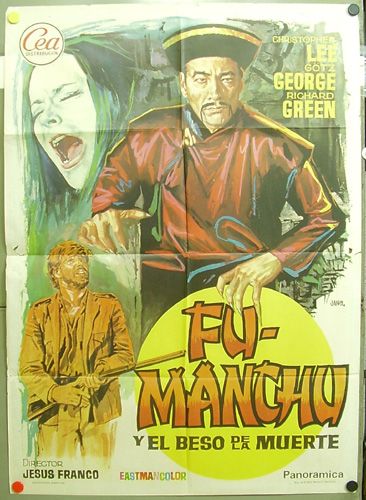 Christopher Lee ... Fu Manchu Richard Greene ... Nayland Smith Howard Marion-Crawford ... Dr. Petrie (as Howard Marion Crawford) Götz George ... Carl Jansen Maria Rohm ... Ursula Wagner Ricardo Palacios ... Sancho Lopez Loni von Friedl ... Celeste Frances Khan ... Carmen Tsai Chin ... Lin Tang Isaura de Oliveira ... Yuma This is Franco’s first film with the producer Harry Alan Towers, who also wrote the script. It is the fifth in the Christopher Lee Fu Manchu series, and is generally considered to be the worst but one (that is the next, The Castle of..., another Franco/Towers effort). It begins with Fu Manchu holed out with his evil daughter Lin Tang in a lost city he has found in the jungles of South America; having discovered a deadly poison that can be transmitted by a kiss and then abducted ten women, he intends to lace them with the poison and use them to destroy his enemies. To start, he sends one woman to London and his greatest enemy, the Scotland Yard agent Nayland Smith. I have a friend who, having seen this film, refuses to ever watch anything by Franco again. He originally based this on a 30 second sequence in which, despite the film obviously being set in the early years of the century, a montage of shots clearly from the 60s are shown: later he modified this view, saying that the film is badly shot and edited, etc: but the anachronism is clearly what jarred the most. And it is jarring, there’s no denying it. But apart from that the film is a decent adventurer, no more ridiculous than any super-villain film that ends with the villain, already having been defeated five times, remains confident that the next time nothing will go wrong and he will prevail (note: he doesn’t, as we will see). There is an intro showing Fu Manchu’s lair, in which he explains his latest plan (this one must work) chooses the already abducted women who are to be his unwilling assassins; and then a group of explorers (led by the hero, Carl Jensen), being attacked by Fu Manchu’s private army. Then we come back to London, with Dr Petrie turning up at Nayland Smith’s house and apologising for being late and Nayland Smith discovering a blonde hair on his shoulder - “Dyed”, he mutters, after Petrie has explained that the woman is a very old family friend. Well, kind of nice, though it really comes across as more seedy than anything, and this whole scene leading to the set-up (Nayland Smith has had word – from his agent Jensen, the explorer we saw earlier - that Fu Manchu is in South America) is played as caricature, and not very well at that. But then the woman sent by Fu Manchu turns up and kisses him (there is a smirk from Dr Petrie at this), striking him blind and at the same time – he eventually remembers - giving him only a few days to live. The game is afoot, and the two travel to South America. Meanwhile Jensen is held up by a corrupt Police Chief who just wants to play chess with him, and a gang of bandits is conducting raids near Fu Manchu’s lair… Greene and Marion-Crawford are the worst things about this film; over-acting, occasionally forgetting lines and missing cues; the script doesn’t give them much to work with – the original characters are no Holmes and Watson either - but they don’t really seem to care. Lee, on the other hand, plays his part decently, and without descending to a cod Chinese accent or raving megalomaniac either; him and Ricardo Palacios as the bandit leader are what makes the film worth watching. Fu Manchu in his lair: 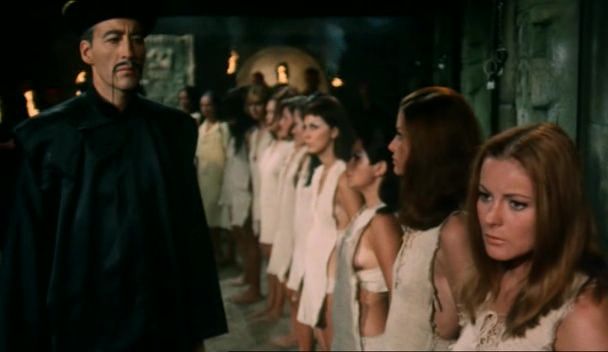 Sancho Lopez, the Bandit: 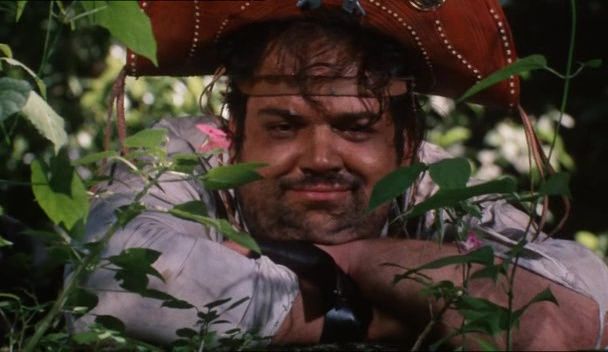 Fu Manchu’s evil daughter (Tsai Chin): 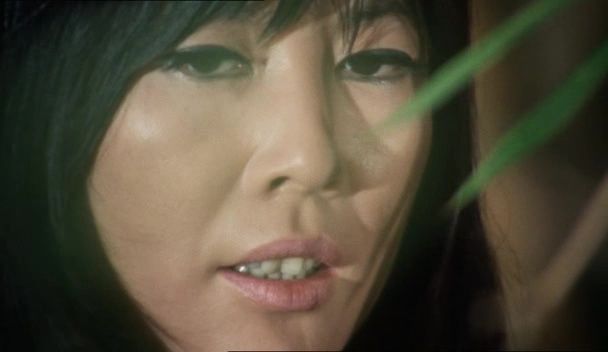 Captured! 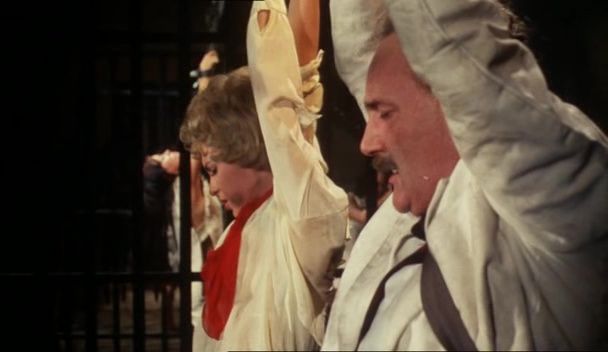 Anachronism: 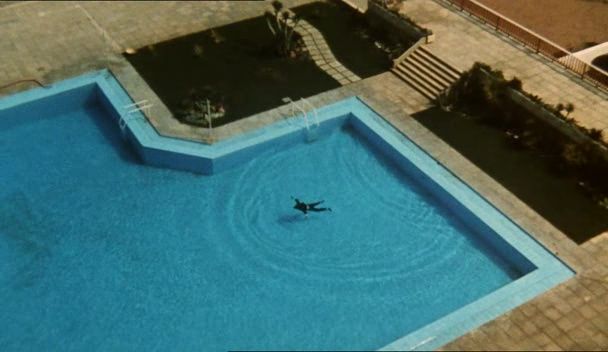 The world has not yet seen the last of me: 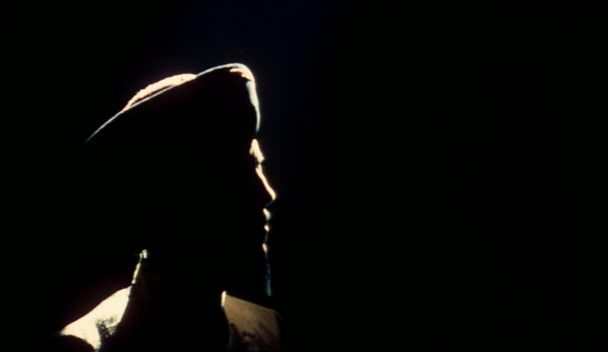
|
|
|
|
Post by marispiper on Feb 5, 2017 13:53:14 GMT
Let's face it, Lee played any part decently!
Out of curiosity, how many of these do you watch during the average week?
|
|
|
|
Post by aubrey on Feb 5, 2017 14:25:15 GMT
With Jess films it's probably only one a month - it's writing the stuff up that takes the time. I'm already two behind - just started The Girl From Rio but it's a while now since I watched it so I don't remember the plot that well. The next one - 99 Women - I'll have to watch again as the version I saw was cut about with terrible hardcore inserts and so badly done that the whole thing didn't make much sense.
|
|
|
|
Post by aubrey on Feb 5, 2017 19:08:03 GMT
last night a kind of comedy Giallo that I've forgotten the title of but whaich wasn't much good. Let's face it, Lee played any part decently! Out of curiosity, how many of these do you watch during the average week? I should have said, yes he did. He's in a few more Jess films, including a couple of his best: I should get to them soon(ish). I watch a lot of other films as well - this afternoon one called Der Sandmann, yesterday a thriller with SF overtones called Hanna, on Friday a Jean Rollin erotic horror film called Les démoniaques (really good, that one was), and yesterday a kind of comedy Giallo that wasn't very good. |
|
|
|
Post by aubrey on Mar 31, 2017 15:18:06 GMT
Die sieben Männer der Sumuru aka The Girl from Rio 1969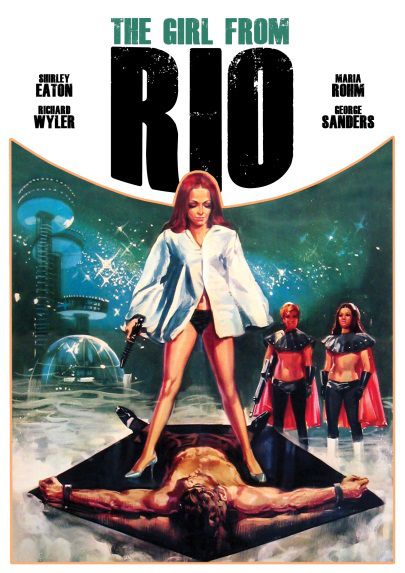 Shirley Eaton … Sumitra Richard Wyler … Jeff Sutton George Sanders … Masius Maria Rohm … Lesley Herbert Fleischmann … Carl Marta Reves … Ulla Jeff Sutton arrives in Rio with a suitcase full of money, and immediately becomes the target of the squeamish gangster Masius and also of the mysterious Sumitra, who eventually manages to abduct him to her woman-only city of Femina, where she explains that she needs the money to help with her plan to institute a world-wide gynocracy, the city being only the start. He is locked in a glass cage with several other prisoners, including Ulla, to whom he explains that his abduction was deliberate, and that he is there to rescue her and defeat the evil (or at least terribly misguided) Sumitra. He is tortured by means of one woman kissing him while another puts a foot on his groin, but soon escapes: “ Can you fly a plane? - There’s one way of finding out!) Sent back to Femina by Masius as the commander of a force intended to steal Sumitra’s funds, he is first caught and undergoes some vaguely specified torture before escaping and attacking the city with a series of coloured smoke bombs and sudden zooms; in despair, Sumitra presses the “Destroy the City” button (literally), and Masius, unable to leave the money behind, dies with her. Our hero and his girlfriend get out. This has the feel of an Avengers episode, with stylish fights, the bizarre punishments and fetishistic costumes of Femina, and a sinisterly humorous villain with a camp henchman and a much younger girlfriend who can’t keep her hands (and mouth) off him, so that he has to break off and snog her in the middle of a meeting. It’s not done with a light enough touch for that though, with Richard Wyler across as dour and humourless, his would-be Bond-style chat-up more a peremptory demand than anything (though it works, of course it does); the script, by Harry Alan Towers, is not up to much either. My favourite section comes quite early on, when Jeff and his girlfriend, Maria Rohm (the one who goes for his chat-up line) are having a stroll on the raised walkways around the hotel grounds and are attacked by Masius’s henchmen, for some reason all wearing animal masks. If only the rest of the film had been as good as this scene; but the scenes with George Saunders as Masius are decent as well, and so are those around the city of Femina, which looks like a deserted airport guarded by rows of women in cloaks and coloured leather (it does seem a pretty dull life for them though, considered how the place was built as a feminist paradise). Femina: 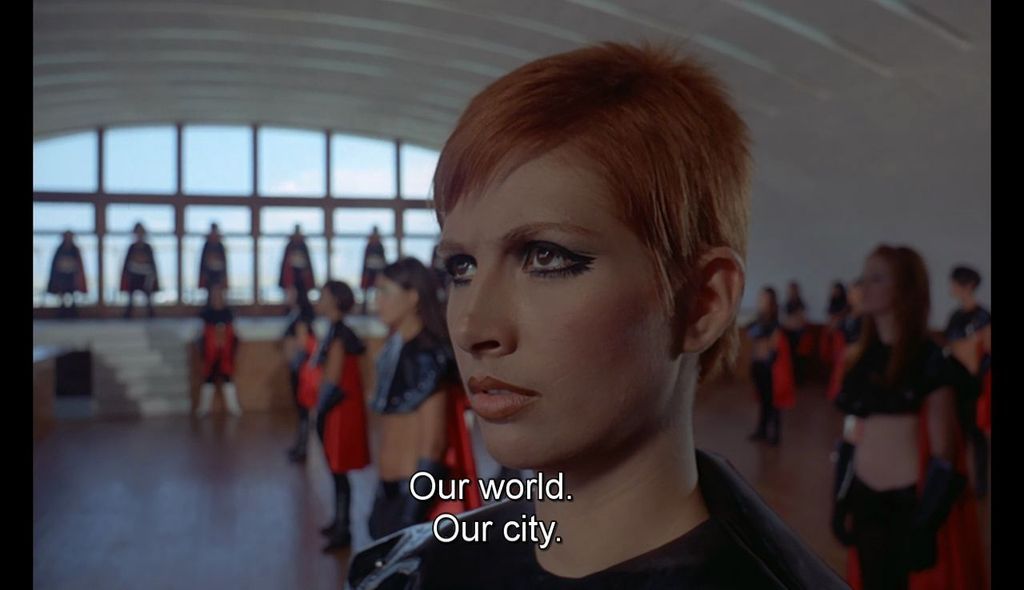 Masius not getting distracted: 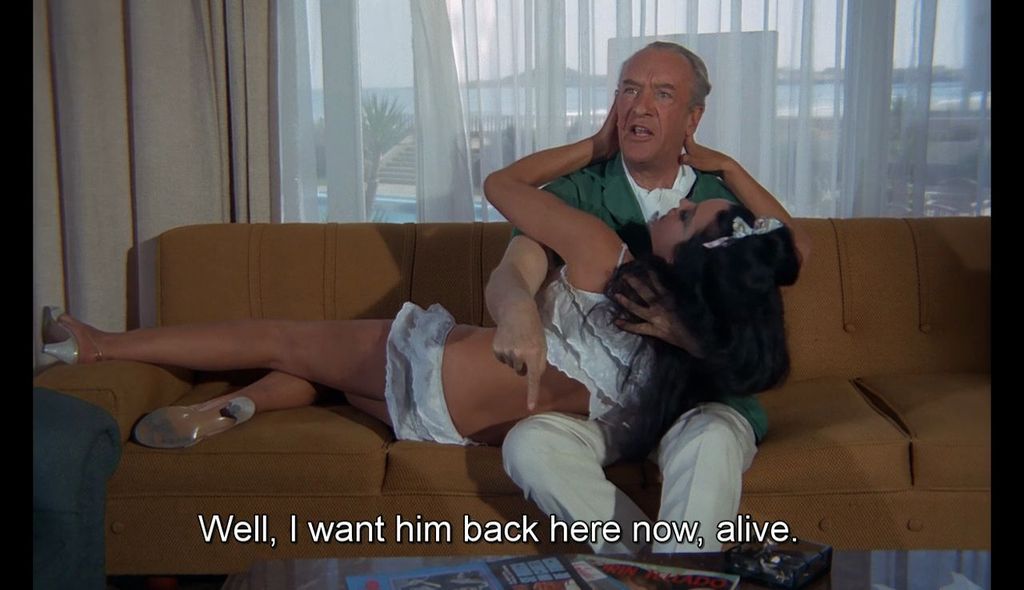 Attacked! 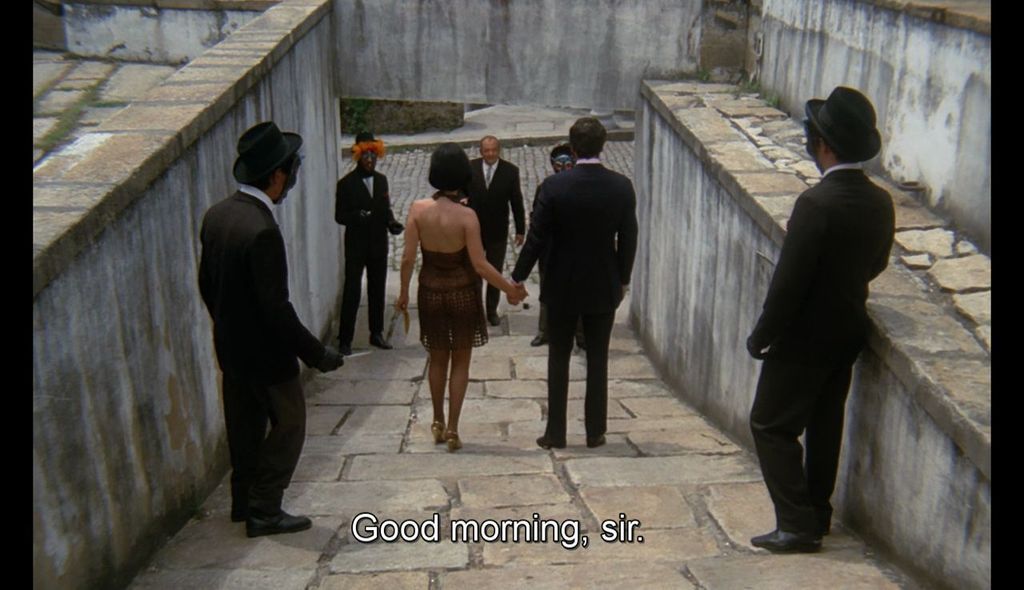 Some Jess magic: 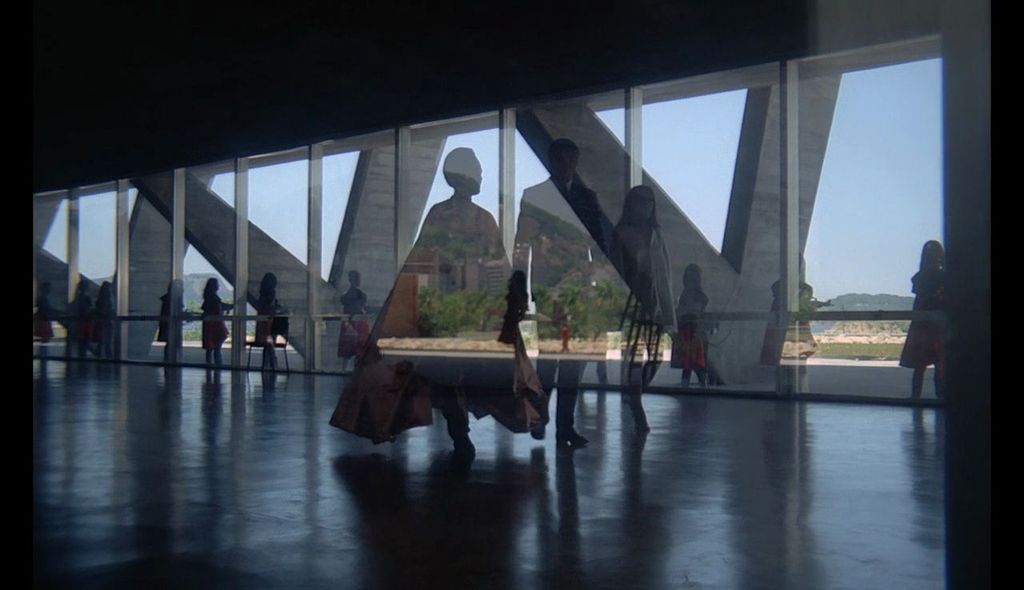 The destruction of Femina: 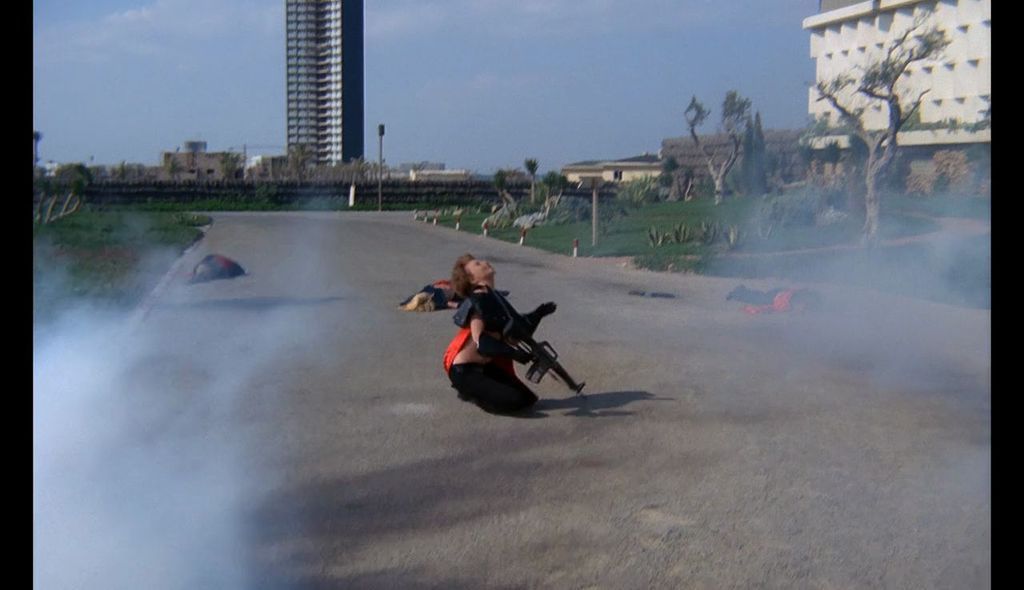
|
|
|
|
Post by aubrey on Apr 14, 2017 13:36:34 GMT
019 Der heiße Tod aka 99 Women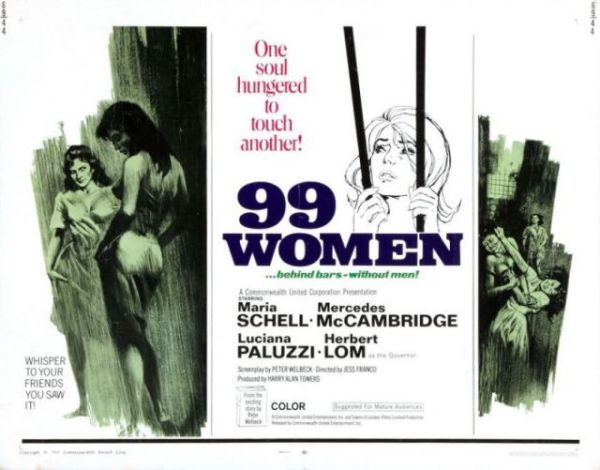 Maria Schell ... Leonie Caroll Herbert Lom ... Governor Santos Mercedes McCambridge ... Thelma Diaz Maria Rohm ... Marie Rosalba Neri ... Zoe Elisa Montés ... Helga (as Eliza Montes)Luciana Paluzzi ... Natalie Mendoza Valentina Godoy ... Rosalie José María Blanco ... Doctor (Like the last two or three films in this list, this was written and produced by Harry Allan Towers) Convicted of murder after stabbing one of a gang of rapists, Maria is taken to an island prison run by Superintendent Diaz, a corrupt sadist who pimps out her inmates to her friend, the governor of the men’s prison on the far side of the island; on arrival Marie is told that she is in a tough prison, that prisons are not meant to be happy places, and then given the number 99 (already out of date since one prisoner has died during the night and there are now only 98). Natalie, who came on the boat with her, is going cold turkey, and when she tries to get help for her Maria is punished for causing a disturbance. Natalie dies, and her death confirms the suspicions of a doctor who has been sent to look into the high number of deaths at the prison. The Ministry of Justice responds by sending an inspector, Leonie Caroll, to observe Diaz’s methods. She wants to institute a new and humane regime and starts by releasing Maria from the punishment cell a week early and promising to look into her case; but then Marie is sent, with her cellmate Zoe, to see Governor Santos... This is Jess’s first WiP film, and is generally his mildest; and while it is still shot through with a sweaty nihilism that does not allow much hope as to how things will end, the prisoners are comradely, even friendly, and usually working together against a common enemy (which is not always the case in Jess’s WiP films), so it could have been worse. The best things about the film though are Mercedes McCambridge (the demon voice from The Exorcist) as Superintendent Diaz, whose tiny body can barely contain her fury when speaking to the prisoners, but who shows a human and even affectionate side when talking with her friend Governor Santos (Herbert Lom, also good). Maria Schell as the inspector wears the same expression of quizzical benevolence throughout, pretty much whatever happens. Thrower is worried by the reaction of both parties following Maria’s rape by Zoe, when they become friends and lovers; but I don’t think he’s right to worry, since at the time of the rape they were supposed to be putting on a show for Santos (mercifully, the camera fades as he comes to join in) and so were both under duress. I made the mistake of watching the French version with hardcore inserts, of which the best that can be said is that they usually get the gender of the participants right; they also hold up the story and confuse the plot a fair bit, adding extra characters and at one point contradicting what we have already been told; the shorter English version without them is much better. There is an incredibly catchy theme song by Bruno Nicolai (sung by Barbara McNair): (I've just realised: there is no shower scene, which is very usual for WiP films.) Opening shot: 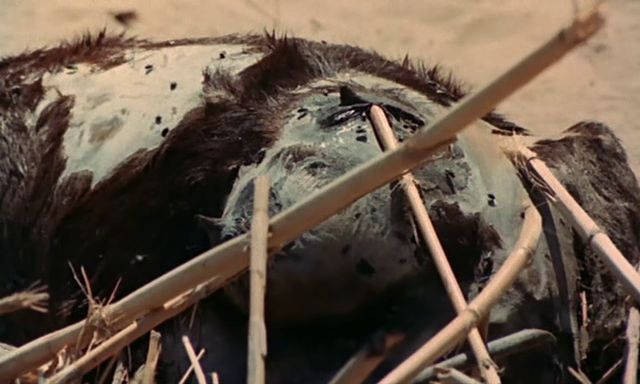 First sight of the prison (Thelma is standing on the steps): 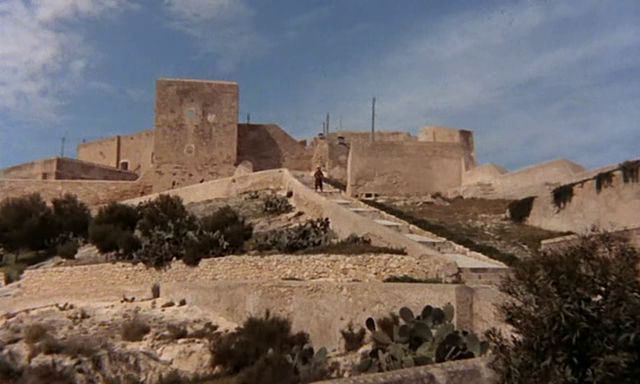 Thelma Diaz: 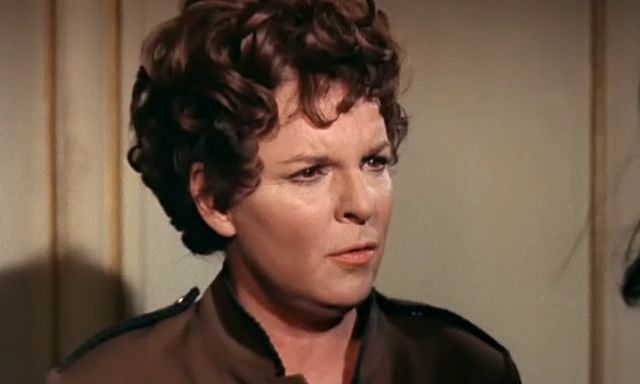 The first Inspection: 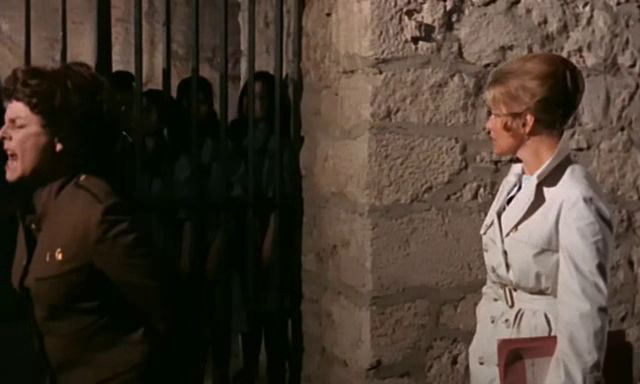 Argument: 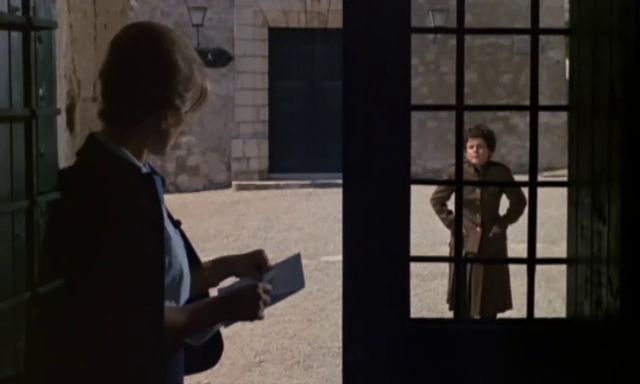 Aftermath of a fight: 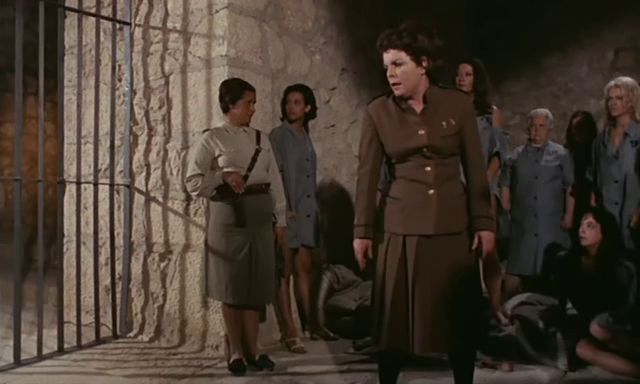 Escape: 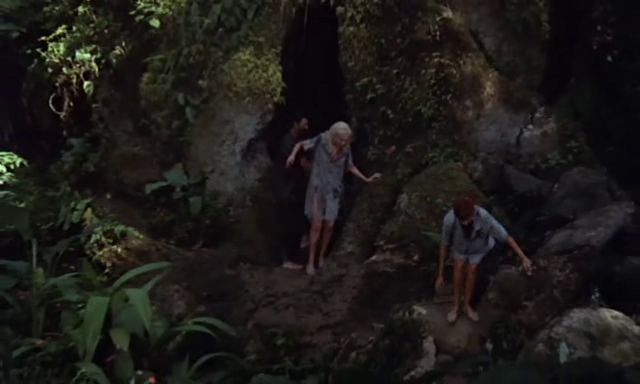 The Happy Ending: 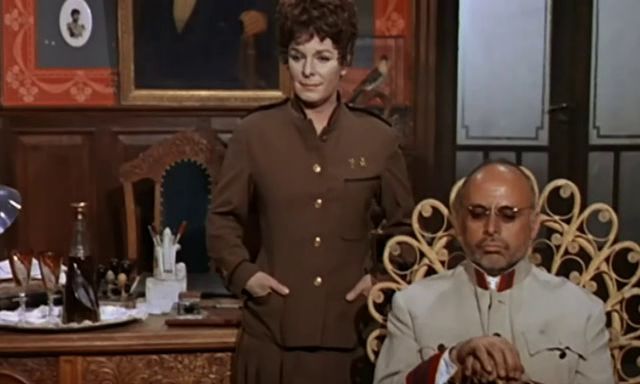
|
|
|
|
Post by aubrey on May 15, 2017 10:54:22 GMT
020 Marquis de Sade: Justine 1969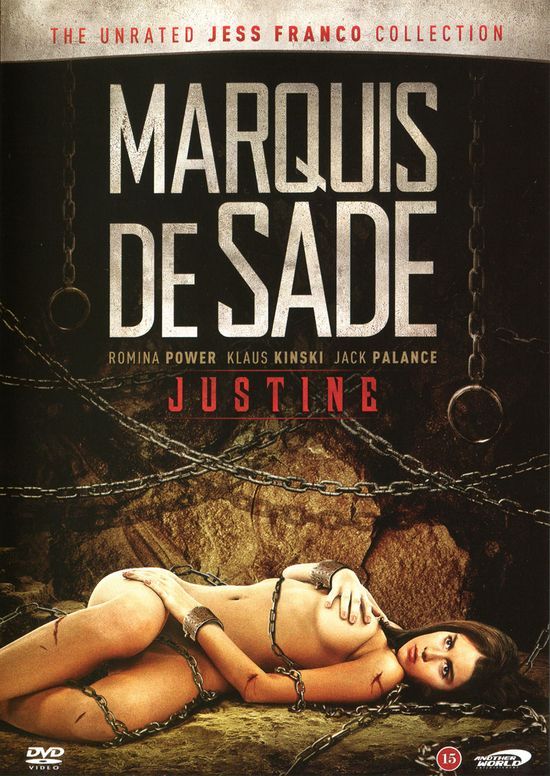 Klaus Kinski ... Marquis De Sade Romina Power ... Justine Maria Rohm ... Juliette Rosemary Dexter ... Claudine Akim Tamiroff ... Du Harpin Mercedes McCambridge ... Madame Dusbois Howard Vernon ... Clement Jack Palance ... Antonin The Marquis de Sade (Kinski) is imprisoned, and then suffers the torment of frustrated desire before settling down to write it out, with the story of Justine and her sister, Juliette, who as the story starts are being told by the nuns at the convent that, as they are now orphans and there is no more money to pay for their upkeep, they are to given 100 marks and made to leave. Juliette knows someone who will take them in, but to Justine’s dismay, the address they have been given is that of a brothel. She leaves, while Juliette decides to stay. The story then follows the fortunes of both girls; but we mostly see Justine, as she has her money stolen by a priest, is accused herself of stealing, is sentenced to death, escapes (both from the prison and the gang she has escaped with), meets a kind artist, is again chased to a château housing a cult of sadistic degenerates (led by Jack Palance), is saved by a thunderbolt, etc etc: at the end of the film she is again about to be executed after the crowd at a strip show see the “M” for murderess (falsely) branded on her chest, when Juliette (who following a life of debauchery and murder is now a wealthy woman) recognises her on the scaffold... This is Jess’s first film based on the works of Alphonse Doniatin, and while had had a big budget to play with the whole thing is terribly compromised: the kindly artist in the original is actually a paedophile who has opened a school so as to be sure of a ready supply of victims; the thunderbolt that saves her from the cult actually kills her, etc. The only real drama comes as De Sade is in the cell, fantasising and furiously writing; at those times the sound track is of a Night on a Bare Mountain intensity; otherwise you have music more suited to a Carry-On romp than anything, with a lot of pizzicato to point out the funny bits. A voice-over (as well as a lot of the dialogue) keeps telling us De Sade’s philosophy, that virtue leads only to misery and death while vice brings prosperity and happiness; and the idea that that the good are always done down by the bad, might be true, but not necessarily how De Sade has it: and the only way it can work for him is to have a fantasy land where anyone can prosper if they are evil enough. Maybe, in the end, De Sade thought of himself as more a Justine than a Juliette, imprisoned for not for living a life of vice but for having reigned in his desires and philosophy. Mercedes MacCambridge as Madame Dusbois, the master criminal who enlists Justine in her escape from the prison, but later expects her to be a part of her robber band, is the best thing about the film; she plays her part broadly but effectively. Palance though is terrible, his characterisation of the cult leader too over-done to be anything but silly, and obviously showing the effects of the bottle of wine Jess said he would drink every morning while on set; Howard Vernon (one of his Brethren) would have been much better. Romina Power (daughter of Tyrone) playing Justine is manages pretty well, confused and unsure of herself; though the giggle she gives on seeing the two homosexual aristocrats pathetic: she should really have been horrified (as De Sade himself very much wasn’t): this was Jess – or the producer and writer, Harry Alan Towers - playing up to the prejudices and humour of the late 60s. The film itself is a good half an hour too long, though that could have been remedied had all the characters spoken their lines at a normal pace instead of drawing every sentence out, sometimes to ridiculous lengths. The end is a further compromise: Juliette repents, and tells Justine that her reward awaits her in heaven; Justine is seen walking with her artist, and then the camera pans up to a cross on the top of a steeple – the voice-over at this point has a definite edge of irony to it: and that scene is followed by the last shot in the film, of De Sade crossing that line out – Jess’s rejection of the moral he has had forced upon him by the film’s producers. De Sade (Kinski) brooding in his cell: 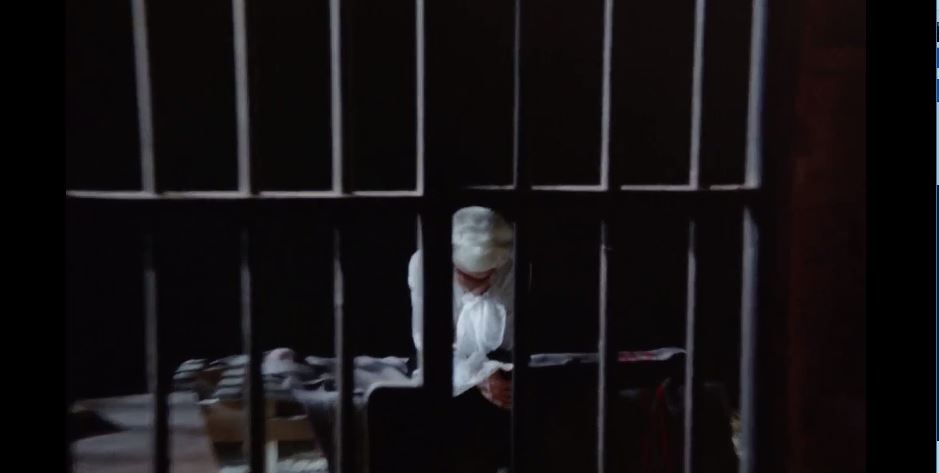 Expelled by the nuns: 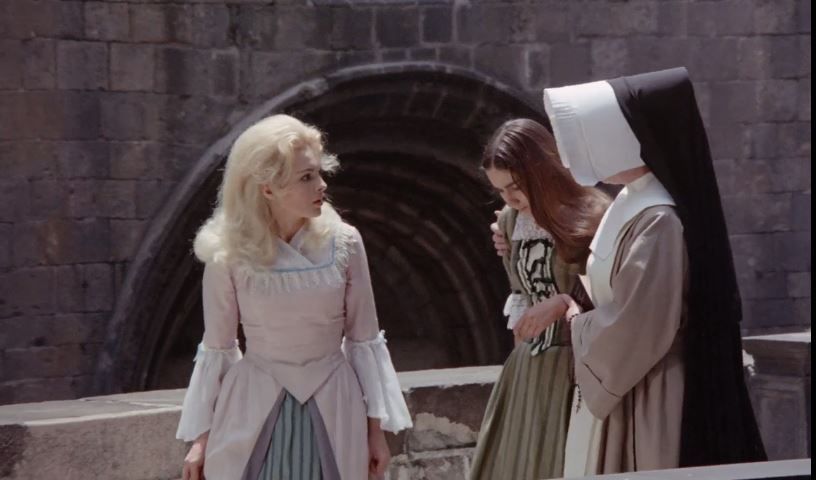 The priest takes Justine’s last 100 Crowns before directing her to a dodgy lodging house: 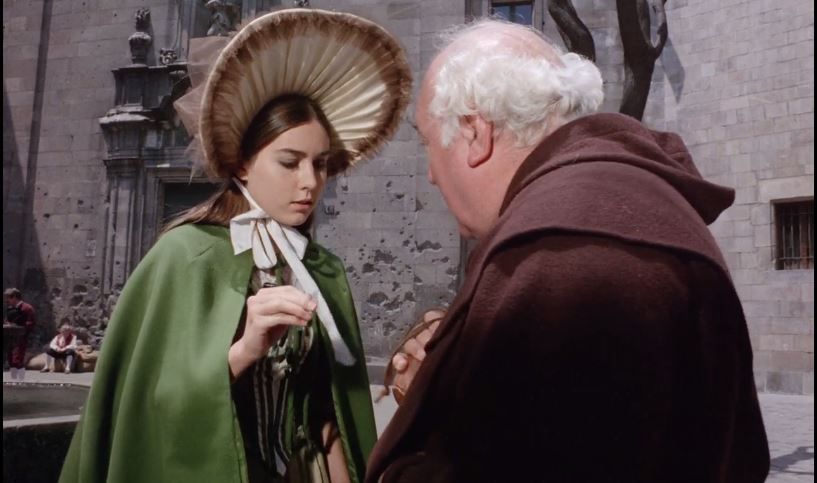 Madame Dusbois: 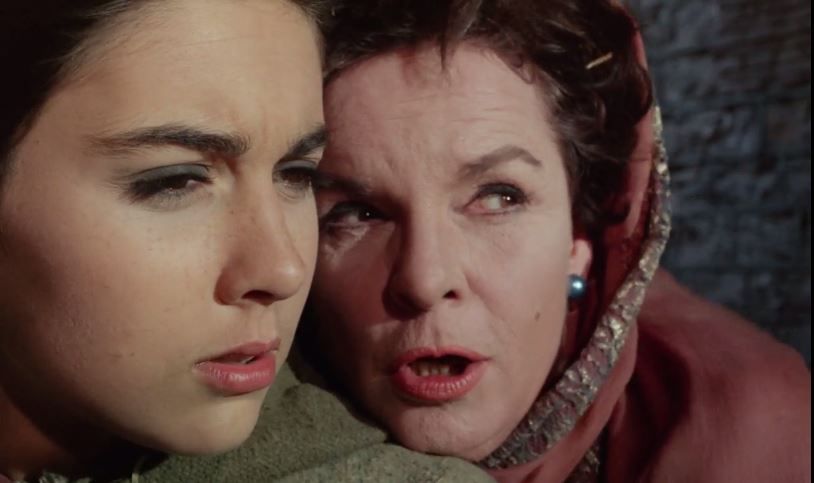 Branded a murderess: 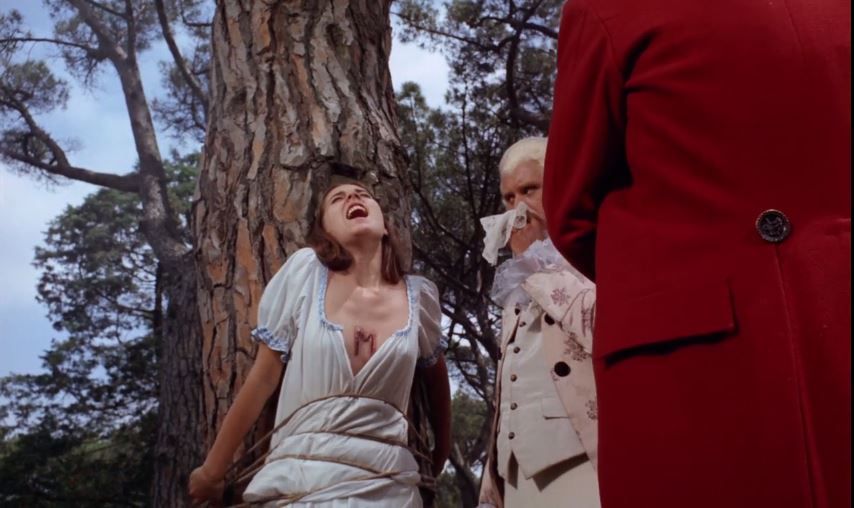 Justine finds her kindly artist: 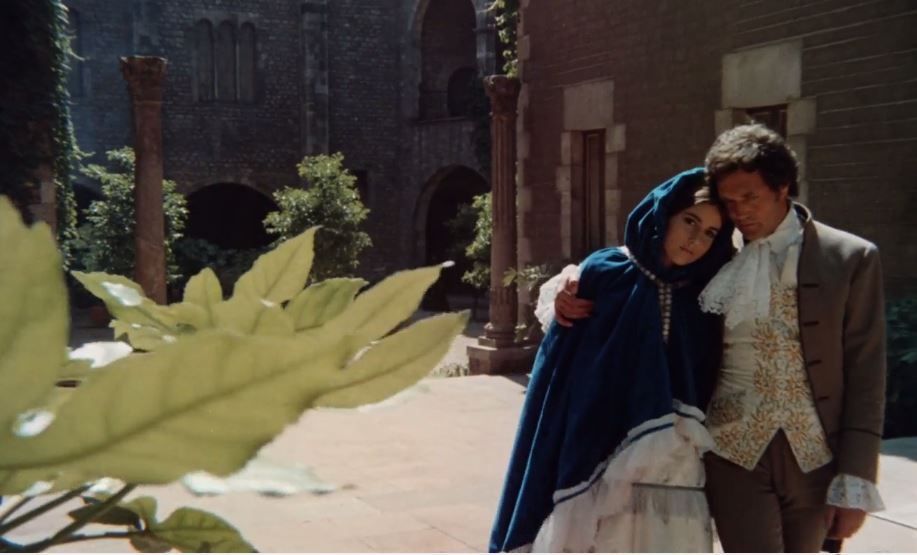 De Sade’s (and Jess’s) disgust: 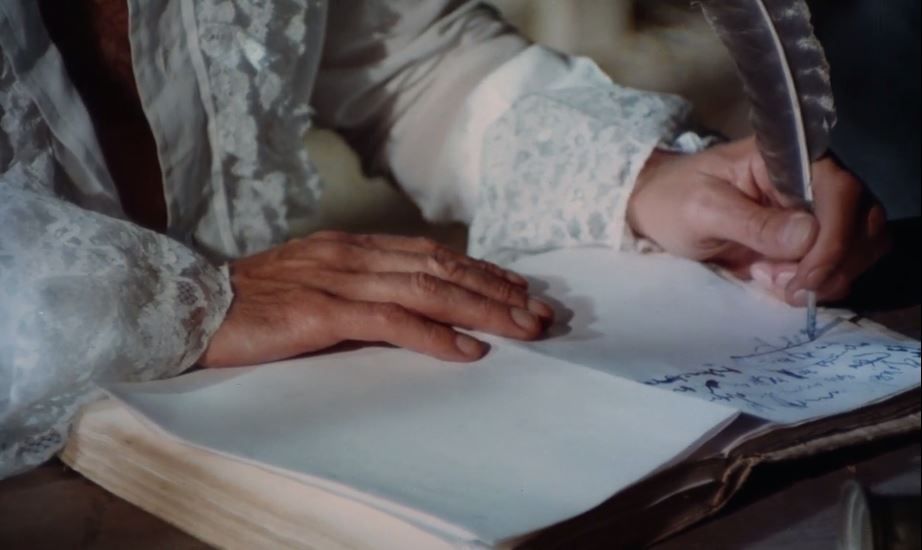 Jess would turn to De Sade many times in the future, usually with happier results.
|
|
|
|
Post by marispiper on May 15, 2017 15:41:17 GMT
Some cross era costumes there for the girls... Still, going by the title poster, looks like they dispensed with them anyway when they got to the S&M rail..
|
|
|
|
Post by aubrey on May 15, 2017 17:09:01 GMT
Supposed to be what, 1770-80s? Unfortunately, no - there is really very little nudity in it - maybe 2 minutes' worth of flashes, in a 2 hour film. Can you believe the poster/DVD cover actually lied?  |
|